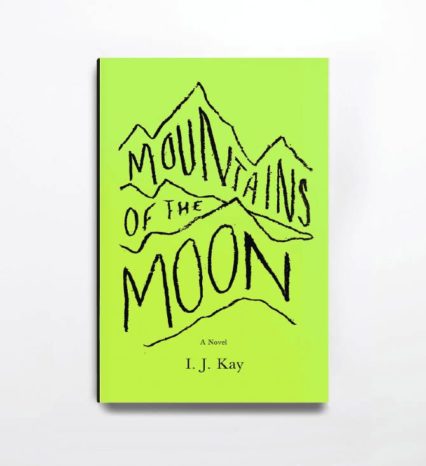Euan Stuart looks at a difficult and disturbing novel by I J Kay, Mountains of the Moon.
There is little that is conventional about this fragmentary, achronological, haunting novel. For a start, the dust jacket provides minimal information about its author. In an era when sales and marketing have become an obsession, it is refreshing, somehow, to be told so little about the writer, other than that she is a woman and this is her first novel. At a guess, she’s writing under a pen name, too.
The novel charts the life of Louise, aka Lulu, Mitten, Beverley, Catherine, Kim, the various stages chopped up and told concurrently. Her story is as slippery as her shifting identity. It appears at first to be the loss of innocence to bitter experience. But as the novel unfolds it becomes apparent that this is a tale of survival, pure and simple.
At the outset we are in recognisable territory. A thirty-
 The seven year old Lulu lives in a household where casual abuse is the norm, and for whom a day at school is the preferred birthday option. Her older brother, Pip, who lulls himself to sleep by smashing his head into his pillow until his nose bleeds, has been reduced to a ‘gibbering wreck’ by their circumstances, so she is the one who takes on the responsibility for her younger brother, baby Grady. She attempts to do her best for him with the touching love of a sibling, while her mother rails both at her and life itself, and her father metes out violence between trips to Holland and his ‘Dutch slut with a name like a chicken.’ Unsurprisingly, in later life Lulu descends into self-
The seven year old Lulu lives in a household where casual abuse is the norm, and for whom a day at school is the preferred birthday option. Her older brother, Pip, who lulls himself to sleep by smashing his head into his pillow until his nose bleeds, has been reduced to a ‘gibbering wreck’ by their circumstances, so she is the one who takes on the responsibility for her younger brother, baby Grady. She attempts to do her best for him with the touching love of a sibling, while her mother rails both at her and life itself, and her father metes out violence between trips to Holland and his ‘Dutch slut with a name like a chicken.’ Unsurprisingly, in later life Lulu descends into self-
The mountains of the title are snow-
It is a difficult life to bear witness to, but not without respite. For all her problems, Louise is a fine tragicomic creation, though the comedy becomes bleaker as we travel backwards in time towards the heart of her particular darkness. She stumbles through life with unintentional humour, in bathetic set pieces reminiscent of some of Martin Amis’ best comic creations. Keith Talent meets Tracy Beaker. On her first day in her new job making doughnuts ‘Something behind me crashes, I see the flying twin arcs of jam arrive in each of my wellies.’ And she hooks up with Gwen, a nymphomaniac who keeps a horse in her front room and owns a talking dog and a recalcitrant Audi Quattro. ‘Don’t know how I got myself tied up in this Gwen-
Against this backdrop of dysfunction, the kindness that strangers show to the luckless Louise throughout her life shines out. On her release from prison, a café owner gives her food and drink, a simple gesture which is recognised by Louise and repaid when she finds work. The owner of the pottery where she is a volunteer spends time helping her to furnish her horrific bedsit, a barren room where ‘Mustard paintwork screams at the grey tile floor and black doors scream back.’ And a fashion student gives her the coat she has painstakingly stitched together for her degree show. These small instances make it all the more poignant that she is deprived of love by the ones who matter most, those closest to her.
These unconditional gestures become the beacons by which she navigates her life. Her family life crumbles away, and she ends up unable to feel anything but a sort of numbness, expressed by the reflection of herself that she sees in mirrors throughout the novel, a ghostly representation that she witnesses as if from the outside. She does manage to form relationships, but seldom chooses the right people and usually ends up on her own again before long. As she says at the outset: ‘I’ve never understood the bond between people and drugs, people and dogs, always wanted a real friend myself.’
Louise’s wry humour and gentle wisdom are evident throughout the novel, as she shines a light on the foibles of others. Gwen spends ‘two hours taming her hair to get the wild effect.’ While her opinion of her solicitor is that ‘As solicitors go he’s brilliant, he’s just such a cunt at his job, that’s all.’ Her voice is so strong and so pure that it almost defies criticism. In fact, during the course of what could be a thoroughly confusing novel, given its fragmented narrative, the reader is seldom pushed off course. This is a testament to the consistency of the writing throughout, which the author appears to be in total control of.
In Louise’s miserable room there are ‘five coats of paint on the dominant wall but the word Cunt still shows through.’ This could easily be a metaphor for her own life. Whatever she does, her childhood envelops her like the coat she wears in cold weather and warm alike. On the surface she is independent and capable, but underneath she is gauche, vulnerable, broken.
At the end of the novel you mourn Louise’s lost innocence, her degradation; but then find yourself celebrating her spirit, her survival, her humanity. What more can anyone hope for from a novel?










